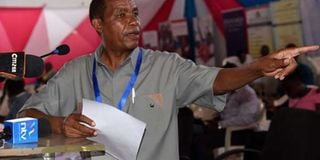We support education reforms, headteachers now tell unions

Kepsha Secretary-General Daniel Mavuta speaks at the Sheikh Zayed Children Welfare Centre in Mombasa as the 13th headteachers annual conference comes to a close on December 7, 2017 where he read a resolution supporting education reforms. PHOTO | KEVIN ODIT | NATION MEDIA GROUP
What you need to know:
- Mr Sossion threated to call for industrial action if the ongoing education reforms are not halted.
- But in their resolutions, the headteachers said they will support the government’s efforts towards curriculum reforms.
- Some of the teachers could not hide their displeasure with the manner in which union officials dismiss even good ideas that they were part of.
Details are emerging on why headteachers from 28,000 primary schools countrywide sharply differed with their union boss Wilson Sossion at the end of an annual conference in Mombasa.
The teachers accused the union officials of endorsing the education reforms at various stakeholders’ meetings only to turn around and oppose the process in media or public forums.
In resolutions read out to the more than 10,000 headteachers, it was clear that though they keenly listened to Mr Sossion’s authoritative presentation last Wednesday, they were not convinced by his line of thought.
SOSSION
Mr Sossion, a nominated MP, rubbished the ongoing education reforms, including the planned rollout of a new curriculum slated for 2018, saying teachers had not been “intensively and extensively consulted”.
He threated to call for industrial action if the ongoing education reforms are not halted.
“Piloting of the curriculum should be for two years. Don’t rush this thing. It will backfire on us. International valuers should also do valuation of the piloting before it is implemented,” Mr Sossion said.
He said teachers have not been trained on the same.
“This syllabus is being driven by World Bank and not Kenyans. Some of the proposals in the new curriculum, like removal of national examinations have been tried and failed in other countries,” he added.
RESOLUTIONS
But in their resolutions read out and endorsed by the teachers on Thursday during the end of the four-day annual conference in Mombasa, the headteachers said they will support the government’s efforts towards curriculum reforms.
“We shall support the Kenya National Examinations Council (Knec) in their efforts to shift from summative assessment to competency-based assessments,” said Kenya Primary School Heads Association (Kepsha) Secretary-General Daniel Mavuta.
Some of the teachers could not hide their displeasure with the manner in which union officials dismiss even good ideas that they were part of.
They said Knut and Kuppet are members of the national steering committee that has been deciding on how to progress with the curriculum reforms.
POPULIST PRESENTATIONS
“We must say no to populist presentations that don’t speak to our hearts. Our leaders have perfected the art of taking controversial positions on issues for their personal interests,” said Granton Mwaliko, the headteacher of Ndome Primary School in Taita Taveta County.
The headteachers seemed to agree with the Kenya Institute of Curriculum Development (KICD) CEO, Dr Julius Jwan, who insisted that the curriculum will empower Kenyan children.
“A curriculum never fails. It can only have challenges. What matters is how you mitigate the challenges,” Dr Jwan said when he addressed the headteachers at the Sheikh Zayed Children Welfare Centre in Mombasa.
CONSULTATIONS
Dr Jwan assured the teachers that curriculum developers are in control of the process and a lot of consultations have been done to ensure the new curriculum fills the knowledge gaps identified through a needs assessment that recommend a change of the system of education.
“For the last three years, we have been working with Kenyans, experts and consulting with various interest groups. This is the first time the curriculum is being developed by Kenyans,” Dr Jwan said.
Dr Jwan said the training modules for teacher training institutions must be adjusted to reflect the requirements of the competency-based curriculum.
“The training must be designed to fit very well in the new curriculum. We are changing the curriculum for pre-service training to fit into the competency-based curriculum,” Dr Jwan told the teachers amidst applause.
TEACHER COLLEGES
He said teachers joining colleges will be trained in the competency-based curriculum and those already there must be given a top-up on this approach.
“We must also re-look at recruitment of personnel who teach at the teacher training colleges. It should not be a place for those demoted or who immediately leave university with a master’s degree, yet they have never trained to teach teachers,” Dr Jwan said.
“We need specialist training for people going to be tutors so that they know how to train teachers. Our teachers are competent and all that is required is to modify training,” Dr Jwan said.
The headteachers expressed confidence that the new curriculum is an improvement of the current 8-4-4 system of education.
Kepsha National Chairman Shem Ndolo said the new curriculum is good but the government must implement it with caution to safeguard against challenges that eroded the gains of the current system.
“The new curriculum is fantastic and we want to see it implemented. But, the level of preparedness is our fear. We don’t want it to be rushed as it happened with the 8-4-4 (system),” Mr Mavuta said.





